Fullmetal Alchemist Brotherhood: The Symbolic and Ironic Deaths of the Homunculi
Probably the most well-known antagonists of Fullmetal Alchemist: Brotherhood are the seven Homunculi. Simply put, a Homunculus (singular of Homunculi) is an artificially created human being, brought to life by the power of alchemy. The Homunculi are unique antagonists in that each of them is the living personification of one of the Seven Deadly Sins. Thus, one Homunculus is the personification of pride, another lust, another greed, another sloth, another wrath, another gluttony, and another envy. They are each named for the sin that embodies them.
Not only is each Homunculus the embodiment of a particular sin, but they are also virtually immortal, their bodies being powered by the energy of the mystical Philosopher’s Stone. Thus, they never age, and they can withstand the most devastating of physical injuries.
But they can be killed.
The creator of Fullmetal Alchemist, Hiromu Arakawa, has the heroes of the story defeat the Homunculi in ways that are epic, clever, and sometimes very violent. It’s easy to get lost in the excitement and violence as you watch Alexander Louis Armstrong hammer away at Sloth, or watch Colonel Mustang completely annihilate Lust or Envy. However, if we take a step back and contemplate the manner in which we see the seven Homunculi die, we are able to realize the mastery with which Hiromu Arakawa tells a story, and the symbolism and irony she places therein.
Let’s look at the death of each Homunculus in turn.
Lust
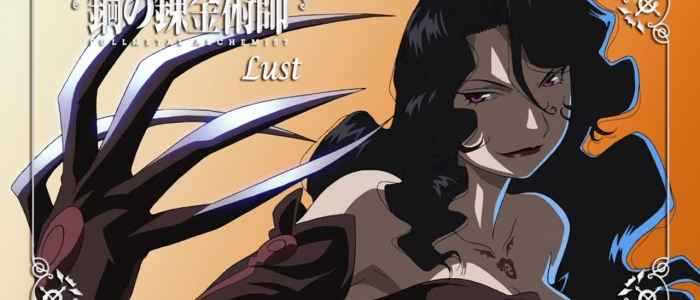
Although the first Homunculus to die is technically the “old” Greed, I think it’s reasonable to say that Lust is actually the first (…because she doesn’t come back!).
The sin of lust is defined as “An inordinate or disordered desire for sexual pleasure”. Whether or not Arakawa based Lust’s character off of that definition, I don’t know. However, it’s clear that Lust’s character is a reflection of that definition, whether intended or not. Depicted as a beautiful woman with long, wavy black hair, too much cleavage showing, and a deep, tempting voice, she embodies the guilty desires that a man might have. The sin of lust, by nature, tempts, and often succeeds in forcing men to bow to their desires, making them slaves to their own sensual wants. Lust is something deceptive that plays on the naturally good desires of a man, and turns them into something selfish.
The Homunculus Lust uses her attractive nature to woo the heart of Jean Havoc, a lieutenant working under Colonel Mustang. Havoc is always looking for a girlfriend, and Lust takes advantage of him in order to gain intelligence concerning Mustang’s plans.
Eventually, Lust and the other Homunculi move in to assassinate Mustang. In a chamber beneath an alchemical laboratory in Central City, a fiery battle ensues. Mustang is the Flame Alchemist, capable of setting the air itself on fire, and so he repeatedly encompasses Lust in a torrent of flames.
Again and again, Lust tries to rise and counterattack, endeavoring to pierce Mustang with her “Ultimate Spear”—basically, her finger nails, which are extremely strong and able to extend and retract back into her fingers at will. At last, Mustang defeats her by eventually wearing out the energy of her Philosopher’s Stone.
What’s so fascinating about Lust’s death? She dies on her knees.
It should also be known that (although more so in the manga), Colonel Mustang is something of a womanizer. And yet here we see Lust, the personification of the sin that makes men kneel to her, dying on her knees before a man. The symbolism is undeniable. It took an unsettling amount of fire, but Mustang, a man, defeats Lust by incinerating her, eradicating her from existence. Is this not what every man should do to eliminate the sin of lust from his life?
(Although I won’t go into it here, it’s interesting to note that there may be a relation between the death of Lust and the problem of pornography in Japan [the home-country of Arakawa]. Is there some sort of message in this scene that Arakawa is trying to send to the men of her country and the men of the world?)
Gluttony
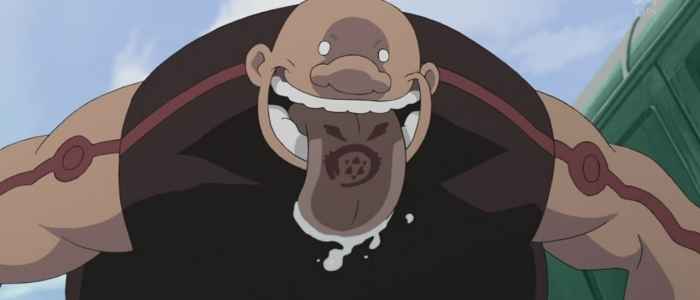
Gluttony is defined as “excessive indulgence in food or drink”. Although certainly not the worst of the Seven Deadly Sins, St. Paul condemns it when he condemns those people “whose god is their belly” (Philippians, 3:19). In the case of Gluttony from Fullmetal Alchemist Brotherhood, such a condemnation is certainly the case. Gluttony is depicted as an extremely large, ever-ravenous man, with a notably innocent attitude. One of his signature lines is asking humbly, “Can I eat him?”
Oh, and that’s another thing: he’s a cannibal.
What’s noteworthy about Gluttony’s death is that, first of all, a hero doesn’t defeat him. Rather, the Homunculus Pride is the one that kills Gluttony for good. And how, you might ask?
By eating him.
There is no heroic symbolism here, as far as I can tell. However, it’s evident that Arakawa thought it would be nice to throw some irony into her story when she decided to have Pride—who was hungry for power—eat Gluttony. How fitting, to have the one who eats everything and everyone get eaten!
Envy
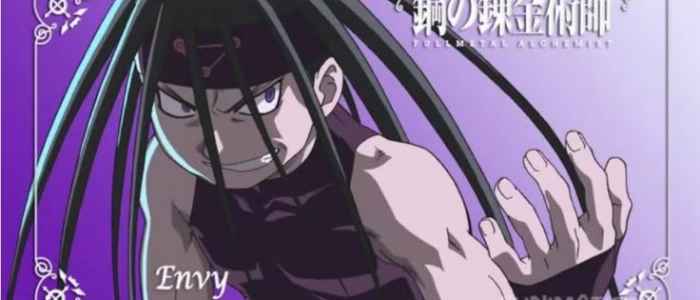
The next Homunculus to die in the series is Envy. The sin of envy is defined as being angry with the happiness of others, or wishing to destroy the goods that someone has, simply because you don’t have them. Envy is capable of finding its way into a person’s life, and it is often a very deceptive sin. We can find ourselves wishing for the downfall of others, and thinking ourselves justified, without even realizing that envy is the root of our feelings. Once again, it’s a very sneaky, deceptive sin.
Thus, it’s fitting that Arakawa depicts Envy as a shape-shifter, capable of looking like anyone.
Envy is the Homunculus that almost always spies on the good guys, gaining intelligence for the other antagonists or working as an assassin. He is defeated by Mustang, who is finally given his chance to avenge his friend Maes Hughes, a victim of Envy. In the fiery battle that follows, Mustang, in his rage, defeats Envy, no matter what face Envy chooses to wear in order to trick Mustang.
Envy’s death is probably the most prominently symbolic. Why? Because Envy commits suicide, after discovering that he has been envious of humans. Throughout the series, Envy was always criticizing humans, looking down on them for being “weaker” creatures. And yet, it is Edward Elric, the main protagonist of the series, that points out to Envy (after he’s been defeated by Mustang) that the whole time, Envy has really been jealous of humans. Jealous for the relationships and companionship that humans have. Jealous, just because he wants to be like them.
And so, having realized this, Envy caves in on himself. His whole identity has been turned inside out, and he hates himself for being envious of humans. In the end, Envy himself pulls out his own Philosopher’s Stone, ending his life.
Thus, the death of Envy.
Sloth
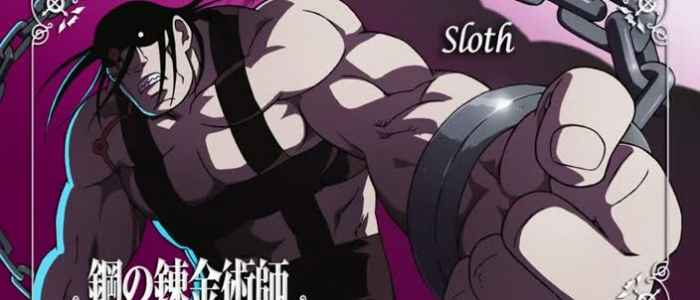
Sloth is casually defined as laziness, but there is a deeper meaning too. Sloth is being upset that doing the right thing is hard; it’s a certain type of depression or laziness that we allow to fill ourselves, making us unable to act in the way that we should.
Therefore, it’s quite fitting that Arakawa depicts Sloth as a meat-headed, dumb giant. Sloth’s number one line is, “What a pain!” Sloth hates doing anything that requires effort…and the sin of sloth makes a person feel the exact same way too. The character Sloth is also depicted with chains, an apt representation of how the sin of sloth can make us slaves to our own laziness and depression.
So, how does Sloth die?
Sloth is sent to kill Oliviae Armstrong, the sister of Alexander Louis Armstrong, the “STRONG ARMED ALCHEMIST!” Louis fights with his sister, and is eventually joined by Mr. Siggs, another man of impeccable muscular stature. In the silly but epic fight scene that follows, Armstrong and Mr. Siggs hammer away at Sloth, wearing the giant’s Philosopher’s Stone out.
What is unique about Sloth’s death? It seems like Sloth has the ability to rise and keep fighting, but eventually, Sloth decides that living is “too much of a pain”. The giant gives up on living because it takes too much effort. In other words, Sloth dies because of his own sloth.
How fitting, and yet another lesson learned at the hand of Arakawa’s story-telling. Sloth, in its most intense form, causes a person to destroy himself by making him unwilling to continue in life. It’s also worth noting that Sloth declares himself as “the fastest Homunculus”, even though he prefers to do everything slowly, because it requires less effort, Sloth delivers the fastest attack. Is this more symbolism, perhaps, indicating that the sin of sloth is able to be committed easily and quickly?
Wrath
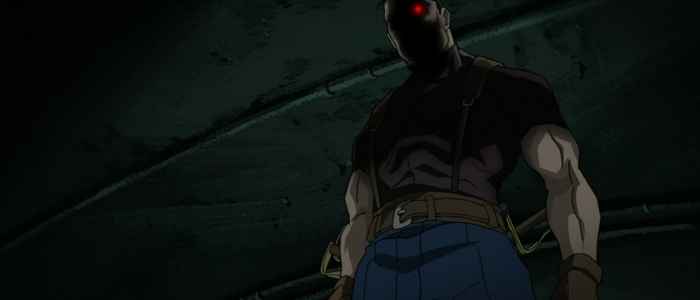
Wrath is defined as intense anger; most especially, anger for the wrong reasons. There are good things to get angry at, such as an injustice a person might be witnessing. And then there is selfish anger, anger that is impatient, anger that exists only for the pure satisfaction of being angry and taking it out on someone: this type of anger is wrath.
Wrath in Fullmetal Alchemist: Brotherhood is the only Homunculus that is capable of aging, since he needs to be more human than the others. For the sake of spoilers, I will not explain why. Wrath is depicted as an elderly man with a left eye that is capable of seeing every single movement around him in detail; thus, Wrath is nearly invincible, so long as he is able to see whoever is attacking him. Other than being just plain, old cool, there isn’t any notable symbolism present in the idea of Wrath’s “Ultimate Eye”, as far as I can tell. Perhaps, it is a reference to how we look at others and judge them, fueling our inner wrath?
The death of Wrath, however, is interestingly ironic, much like the death of Lust.
It takes many heroes to finally defeat Wrath, but the one who finishes the job is Scar. Scar is a serial killer, whose thirst for revenge led him to find and kill all State Alchemists. Scar’s nation was destroyed by State Alchemists, and so he was determined to rid the world of them. But Scar joins the side of the heroes and gives up his desire for vengeance when he realizes that there is a threat to the world much bigger than the State Alchemists, a threat, in fact, that has been behind the violent acts of the State Alchemists.
Thus, the battle is between an ex-murderer, and the personification of the sin of wrath.
Wrath is defeated when light is reflected from his own sword into his eyes, and Scar uses alchemy to blast off his arms. Wrath, indirectly betrayed by the weapon he uses to assert his feelings of anger, is killed by a serial killer: a serial killer who has overcome his own wrath.
The story of Hiromu Arakawa simply hums with irony and symbolism. Her genius continues to shine as the series progresses!
Pride
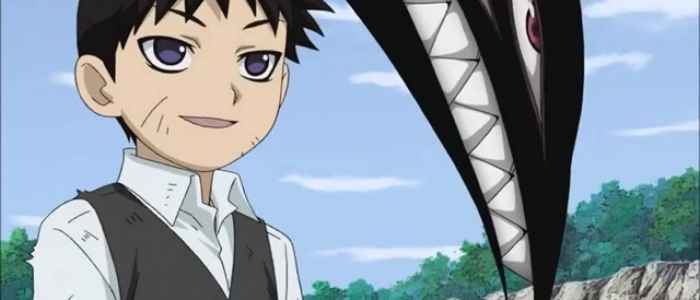
Pride is the only Homunculus that doesn’t die. However, he is defeated, and it seems that his sense of pride vanishes thereafter. Perhaps then, it is still right to say that Pride dies.
Pride is “the excessive love of one’s own excellence”. The sin of pride causes us to look inwards, focusing only on our own personal ego, and also to look down at others, and how they have failed, and also to look above others, thinking them unimportant. Pride is “the father of all sins” because, as the story goes, the Devil thought himself better than God, and thus sin and evil were brought into the world.
Thus, it is fitting that Arakawa makes Pride one of the most powerful Homunculi, if not the most powerful. Ominously, Pride is depicted as an innocent little boy, who acts like a normal child in one moment, but then in the next, has the voice of an evil spirit, and the stare of one who is possessed. It all makes sense: pride, being the father of all sins, is so easily overlooked, like an innocent, little boy. And yet, like an evil spirit, it is able to possess us.
Pride is defeated by the main protagonist, Edward Elric (Ed). Pride’s body is nothing more than a “flask” that contains his Philosopher’s Stone. Unfortunately for Pride, his body has begun falling apart, due to the length of his life and the intensity of the battles he has been in. He plans on taking Ed’s body, since his is deforming. However, Ed is able to turn himself into a Philosopher’s Stone, going inside of Pride in order to diffuse the Philosopher’s Stone that empowers the Homunculus. Edward is only able to do this, however, when Pride is distracted.
Philosopher’s Stones are comprised of souls that have been sacrificed through alchemy. A certain soul in Pride’s Philosopher’s Stone, an alchemist named Kimblee who had been working for Pride before Pride consumed him, speaks up as Ed and Pride fight. Kimblee accuses Pride of stooping from his dignity as a Homunculus to take the body of a human. Pride is distracted, unsettled by Kimblee’s words, giving Ed the diversion he needs to defeat Pride.
Pride’s defeat is much like Envy’s. Envy wanted to be like humans, and thus he killed himself; Pride stooped for something lower than what he actually was, and lost his edge in the battle. Ed doesn’t kill Pride, but rather reduces him to an innocent little fetus. The next time we see Pride in the epilogue of the show, it would appear that his pride has utterly vanished. It is also worth mentioning that, earlier in the series, Ed always seems to be a prideful, little brat. And now, in the finale of the show, his character has obviously grown a little more humble…and humility is the opposite of pride. It sure seems fitting then, that the newly humble Ed defeats the personification of the sin of pride.
Greed
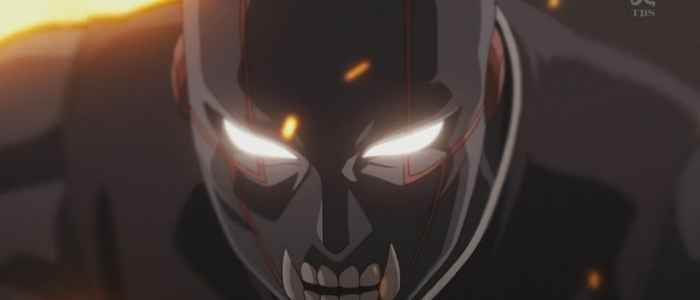
The last Homunculus to die is Greed. Greed is an “inordinate love for riches”. In Fullmetal Alchemist: Brotherhood, Greed “demands the finer things in life…money and women, power and sex…”. He wants to be all powerful.
Greed’s character, in it’s relation to the sin of greed, is quite obvious, if not the most obvious out of the other Homunculi. He is blatantly the embodiment of greed. Greed, for the most part, is actually on the side of the good guys, since he shares a body with Ling Yao, a friend of Edward.
What’s interesting to note about Greed’s death is that he isn’t defeated. He sacrifices himself. Out of any of the Homunculi, it’s easy to admit that Greed’s death is the most meaningful, and even touching. How does Greed die, and why does he sacrifice himself?
Because all he ever wanted was friends.
Yes, in the end, Greed dies because he realizes that his friends are all he ever needed to be satisfied. He doesn’t need power or riches. Greed really isn’t so greedy when he dies. After weakening the body of the ultimate antagonist, his Philosopher’s Stone dies out, and he fades away into the sky. Greed’s death is so wonderfully symbolic because Greed himself solves the problem of greed. In order to defeat greed, we needn’t look far and wide. The answer to getting rid of greed is to look at what we have and be thankful, and focus on bettering the lives of others, instead of ourselves.
The last Homunculus dies as a friend to the heroes…because they are his friends too.
Hiromu Arakawa’s story is filled with symbolism and irony. Many lessons, as we learned, are able to be taken away from Fullmetal Alchemist: Brotherhood. The sins of lust, gluttony, envy, sloth, wrath, pride, and greed are all present in our world today. But, like in Fullmetal Alchemist: Brotherhood, all of them can be defeated. We can all have “fullmetal” hearts!
What do you think? Leave a comment.
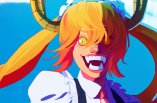
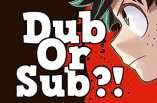
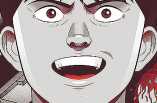

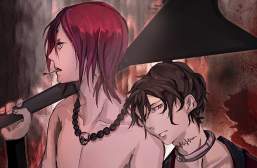

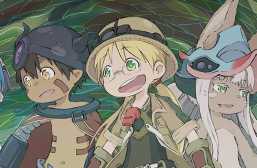
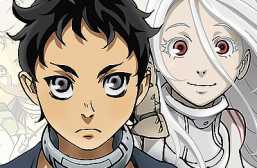
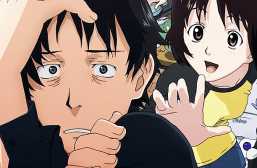
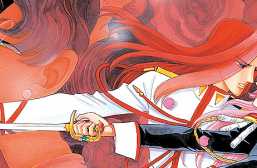
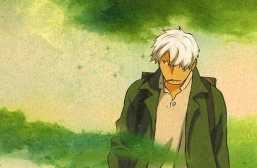
Homunculi in FMAB is better then FMA homunculi!
FMA and FMAB are different. FMA was the first anime and FMAB was the second which (as far as I know) followed the manga. And Bradley was Wrath in FMAB and his son Liam was Pride. And Sloth was a giant tunnel digging homunculus.
To be honest the original anime was far more emotional and sad than it’s successor. And most of the homunculi in the FMA have sad backstories but I do think that they know brotherhood is because they explain who father is and how he created the homunculi.
I read the manga first so when I watched Fullmetal Alchemist I was disappointed. I didn’t hate it. The 13h (if I remember correctly) episode was hilarious. Then I saw FMA:Brotherhood and I was sooooo happy. I actually bought the full series and then watched it ^.^ I was satisfied.
Thank you for this piece on FMA Brotherhood. It’s amazing after Gintama my fav anime. Specially since I like symbolism.
Omg, I love Gintama!! But this piece was exceptionally in depth and a great read:D
It would be nice to see the character representing Lust to be either androgynous or male. Easily signifying sexual promiscuity through the objectification of the ‘evil woman’ trope is sexist and outdated. The entire deadly sins thematic is a bit problematic for me and shot through with overt Christian moralizing, abstracting elements of the human condition far more complex than a singular moniker can explain.
Having an androgynous or male Lust would definitely add an interesting twist to the symbolism. Men are lustful and seductive too, oftentimes in more sinister ways than women. I wouldn’t call a female Lust outdated however…perhaps lacking creativity, if anything. I would still consider it fitting to have a female Lust, as women are historically and naturally more beautiful than men, and thus their powers of sensual allurement are greater.
On the note of Christian moralizing, something else that Arakawa does to enrich FMA is draw from many different religions and cultures. There are Christian themes, but also Islamic, Western, and Eastern themes also. As a Catholic Christian, I appreciated the fact that the enemies were named after well-known sins. This was one of the reasons why I was so inspired to write about this, and I hope that can at least be understood, if not appreciated.
Thank you for your thoughtful comment! Cheers!
It really doesn’t matter if something is outdated as long as it serves its literary purpose. This comment reads like a complaint on a non-issue.
Also no, it’s not “problematic.”
I feel like whenever FMA is discussed, the topic largely hinges on differences between the animes or the existence of alchemy or the main characters. I’ve encountered little that actually focuses on the homunculi – the fantastically developed and symbolic villains. They play a huge role in the story and were perfect reflections or oppositions of the heroes (i.e. Mustang and Lust, as you point out) – so I’m incredibly pleased to have read this article. When I finally read the manga two years, I was honestly in awe over how much of a genius Arakawa is in the use of alchemy and the parallels to our own world history – but the homunculi were definitely something else that just added so much more to the story, their deaths included.
Absolutely, Arakawa is a genius. I have a confession to make: I used to be rather sexist when it came to story telling; I used to believe that male writers were better than female writers. I am happy to say that Arakawa completely changed my mind, especially since FMA is one of the greatest stories I have ever encountered. Cheers!
I also liked that you focused on the Homunculi, they each have such interesting back stories and endings. They’re my favorite part of the storyline and you don’t see much discourse about them!
Greed is definitely my favorite villian of all time.
Great analysis! Everyone should experience FMA:B at least once in their lives; it saddens me that I’ll never get to watch it for the first time again.
The ending of this had me on the verge of tears.
By far, that is the greatest compliment I have received! I’m glad you were able to take something away from this, or feel moved by it.
For a shonen anime, Fullmetal Alchemist: Brotherhood really goes above and beyond.
The post-anime depression for this anime is totally devastating. This is the third article I read on FMAB today. Best one too! 😉
Pride was the most interesting homunculi in my opinion. He may not have the most unique powers but the idea of them are pretty cool. He is a complete bad ass and he has the perfect attitude to fit is role. He is more powerful than the rest. The idea of him being shadows or something like that makes him more menacing. He is also a kid making him creepy and we all assumed at first that he was not that really important to the story or much of anything. Once we figured out he was a villain was surprising unlike the others where you could tell right off the bat that they were bad. Due to the fact that he is a shadow kid makes him seem kind of creepy. This makes him seem like more of a villain after we figure it out.
Yes, I totally agree with you. Having watched the 2003 version of Fullmetal Alchemist first, I was surprised that Pride was actually Sileam. It was a huge plot twist that I really enjoyed!
My favourite homunculus is either greed or envy. What’s yours?
My favorite is definitely Pride!
My list is…
7: Sloth, found him really boring and having no characteristics outside his sin.
6: Envy, found him annoying, but he was important to the story and has cool powers.
5: Pride, he is terrifying, but a great villian. Just found him a bit less interesting than the others.
4: Wrath, has cool powers, interesting personality, and a fitting end. I just like the others more.
3: Lust: Cool design, is like a big sister to Gluttony, and is a great manipulator.
2: Gluttony, he is freaking adorable in his normal state, and is probably the nicest out of the Homunculi.
1: Greed, my favorite anime character. Maybe I just have a thing for snarky characters with a heart of gold characters. His powers are awesome, being defensive, but can also fight. Also, his relationship with Ling and the others is very well done. Finally, if Greed didn’t sacrifice himself, Father would’ve won.
My list:
7. Gluttony
6. Wrath
5. Lust
4. Pride
3. Sloth
2. Envy
1. Greed
My top is
1. greed
2. king bradley
3. sloth
4. envy
5. gluttony
6. pride
7. lust
I personally rank Wrath up there in terms of villians, right up there with Archer and kirei from Fate/Zero, and Light Yagami of Deathnote. Wrath just always struck me as a complete badass, what with his incredible swordplay and noble demeanor. He certainly lives up to his title as Furor King of Amestris. I really did appreciate the clarification of the symbolism behind his death at the hands of Scar as well as the deaths of the other humunculi.
I like how in the anime a few of the homunculi turned to be not so bad
I really can’t describe what I felt while I watched this anime. I’m not super fond of animation, but lately I’ve started watching anime and got interested in Fullmetal Alchemist: Brotherhood. This is definitely the best anime I’ve ever watched. Really, the plot is amazing, deep, well built and almost every episode is important.
This is a Shonen series that really stands out.
Personally, I think you overthought the topic a bit, and saw symbolism even where there was none. But I might be wrong 🙂
Also, as a writing tip: too many questions asked. For every homonculus, there was at least one “why is he special?” “How is it ironic?” “How did she die?” After a while, it could possibly get boring for the reader to read you answering your own questions for yourself 🙂 makes it feel more like a monologue and less like an article 🙂
Keep up the good work with the articles, I hope you write many more! ^^
Hey, maybe I’m just that good? :p
Hmm, okay, thank you for the tip. I can see what you’re saying. I have a blog that I try to keep up with, so sometimes my articles here can sound a little “bloggy”.
I’m glad you liked it! Thank you!
Fantastic article Almost every character on the show is fascinating in their own way, with some quickly becoming my favorites. The development of the plot with these characters interwove into something remarkable.
Your article made for a gripping read especially considering that I love to look out and hunt for rich symbolisms in everything I see. I really liked your organization of the post too. Thank you for the interesting perspective.
I think this series is interesting, and has a large amount of symbolism. The battle between wrath and the others was entertaining. I enjoyed the article.
This anime is an obvious ripoff of the best anime ever created, school days. And a bad one at that. This anime’s only purpose is to sell toys to 2-year-old girls.
Greed is the best one.
There’s so much symbolism in FMA brotherhood.. that’s the reason it’s my favorite anime
It very interesting how this is something that should be common sense but isn’t something most would notice right away. It makes me want to rewatch the series to see what else I had missed the first time.
Brilliant article!
It was a rather interesting article to take on. I was only familiar with the original incarnation of Fullmetal Alchemist and have only caught a few episodes of Brotherhood but it was interesting to see the differences in the portrayals of certain homunculi. And I do like the poetic way they are defeated if that was the creator’s intention. Great read and well put together.
I am a huge fan of the series (bother manga/anime adaption and original anime) and also a huge fan of Dante’s Divine Comedy. Seeing some connections between the dates of the damned and the homunculi here, I couldn’t help but put down what I could remember off the top of my head. Maybe it will clear some things up.
Short version: Every death was Ironic.
The irony in Lust’s death seems to be both that she was killed by a notorious womanizer and died, burned alive, on her knees shortly after telling Mustang that it would take “a lot more than you’re capable of to get me on my knees.”
Gluttony’s is fairly obvious, being eaten and all.
First Greed’s ironic death comes from the fact that he was boiled down to extract his most valuable part. Greeling’s ironic death is that he gives his life to save his friends after realizing that they were all he ever really wanted anyway.
As for Sloth, he dies after being worn out from a very, very long fight.
Wrath is killed by Scar, who was formerly wrathful (like Bradley) but gave up his quest for vengeance and ended the cycle of hatred.
Envy kills himself when he’s humiliated by the revelation that he’s actually jealous of the one thing he claims to hate and resent the most.
And, finally, Pride is killed when he tries to give up his own pride.
Long (Philosophical) version: Irony is a bigger son of a female dog than Karma.
Gluttony being eaten by Pride can be seen as a reference to Dante’s Inferno, where the gluttonous are continually tortured by being eaten by Hell’s guard dog Cerberus.
Lust’s death at the hands of Mustang could be a direct reference to Dante Alighieri’s epic poem “The Divine Comedy” wherein the lustful are tossed about by fiery winds while in Hell and purified by passing through walls of intense flame while on the seventh terrace of Purgatory.
During its final fight with Roy Mustang, Envy’s eyes are repeatedly boiled away by Roy’s flames. This bears some similarity to the second terrace of Dante Alighieri “Purgatorio”, in which the envious are cleansed by having their eyelids sewn shut.
Greed’s body being shared with Ling could possibly be a reference to Canto XXV of The Inferno. In this Canto the thieves are subjected to the constant loss of their bodies to the lizards that inhabit the seventh Bolgia. In life they took the substance of others, transforming it into their own, so in Hell their very bodies are constantly being taken from them and they are left to steal back a human form from some other sinner.
Sloth’s pattern of never-ending activity is a reference to Dante Alighieri’s “Purgatorio”, in which the indolent are told to engage in constant activity to cleanse them of their slothful ways.
It’s been a very long time since I watched the series so I can’t confirm or deny Wrath and Pride’s links to the Divine Comedy. I do know that the Prideful were forced to push rocks and other humbling and monotonous things.
I hope this helped.
Woah thanks for the parallels!! That’s so cool!
Great Story
Lusts death was so well though thought out made mustang my favourite character till pride was introduced, so badass
I know i might be sending this comment 10 years after u’ve written this, but i just bonged the whole series. I think there is a bit more to the symbolism about Wrath than what u mentioned. It’s often said that anger or wrath makes us blind.. “blinded by rage” so to speak. So the symbolism lies in the fact that Bradley says more than once during fight scenes that “you’re trying to stay in my blind spot”; and also thay his sort of “superpower” is an all seeing eye to counter for the blindness that comes with rage; similar to how you deduced that Envy’s shapeshifting comes from the fact that it’s a sin that can creep on a person in a lot of shapes without a person recognizing. The defeat of Wrath completes this symbolism, as Greed blinds his all seeing eye during their fight, and then the sun’s reflection on his weapon of choice blinds his normal eye and finally allows Scar to defeat him.. so he is truly blinded by rage, which brings his downfall.
I think there’s also another meaning to Wrath’s death, aside from being killed by someone who overcame his own wrath. In his final moments, Death is peaceful, dying with a smile on his face, not at all angry at the prospect of his death. It goes against his very nature, which I think is another beautiful point of storytelling.
Thanks for writing such an intriguing article! I love finding hidden meanings, symbolism, and irony in the shows I watch because it means the creators have really thought deeply about the themes and morals they wished to convey. I think Greed’s death was my favorite because of the symbolism, but reading this article has made me appreciate the irony in Lust’s death and Envy’s death. I also thought that it was interesting that Lust, the sin associated with fiery passion, is killed by flames. The article also provided some interesting insight about the Homunculi’s appearance such as the chains on Sloth or the shape shifting abilities of Envy. A great read!
Lust’s character and death really don’t seem symbolic in that way. Is the fact that she dies on her knees supposed to be ironic because she died in a sexually submissive pose? Or because she used a man through his lust and ended up being killed by a man? That isn’t really ironic since she didn’t show any lust throughout the whole series. She was just looked attractive on purpose and used that to her advantage, by using the lust of other people rather than displaying any herself. Not that I think Arakawa didn’t know what she was doing; I just don’t think her death is ironic. ^^ That guy’s quote from Dante Alighieri seems to be directly related and would explain some of her symbolic choices though, that’s cool.
Ich like your work in this article. Especially that you have took your time to Analyse the deaths and the 7 sins.
Awesome job fully. I’ve shared your article a couple of times while just reading it once. Thank you for putting your time towards this and sharing.
Wow! Thank you. I really appreciate it!
Awesome job fully. I’ve shared your article a couple of times while just reading it once. Thank you for putting your time towards this and sharing.
I always thought that since Father through away all the other Sins, he was left with the last which most represented himself. Despair.
The biblical sin of sloth isn’t just laziness – the more literal definition is acedia. To waste one’s own potential and talents. To be unwilling to live up to being your very best self. Which is why Sloth was the fastest, quite probably the most physically powerful, of all the homunculus – he had the greatest potential and innate talent/ability but absolutely to do fulfill that potential unless forced to do so, and even than begrudgingly to the very end. Because even dying was “such a pain”.
You missed out on the fact that in every fight Wrath wins, he is attacked first (his opponents acting upon their own wrath), the wounds he takes and the eventual loss of his life come from times when he indulges his own wrath.
I find it interesting to look further at Sloth and his writing. He’s pretty forgettable, especially comparing him to the 2003 anime’s interpretation, and appears very messily in Brotherhood. The writing is inherently reflective of his lazy and unmotivated character; he’s introduced very quickly and sloppily, and not to slight Arakawa or the anime, but Sloth winds up to be an incredibly boring character with little input. Perhaps its ironic that his character is written just as lazily as his namesake…
Fullmetal Alchemist: Brotherhood was the second anime I saw, and it is the second best (after Death Note). I love Greed (because both he and Ling Yao are so cool), and his sacrifice definitely adds to his awesomeness.
I cannot think of the Seven Deadly Sins or Homunculi anymore without thinking about this anime. You explained each sin and character very well. Thank you for such an interesting and informative article.
I would also like to point out another detail behind Wrath’s death. As a man who so vehemently hated what religion did to people, he died by what seemed as an act of God.
When criticizing the Ishvalan leaders, Bradley explicitly criticizes them for letting all responsibility for their feelings fall in the hands of their god, and spoke something along the lines of, “If you hate me and want vengeance, take it for yourself. Do not rely on this figure you call God.”
And, it juts so happens that the reason light reflected from his sword and blinded him temporarily is because of the eclipse: a common event linked to religion. So the man who hates the symbolism behind God was, literally, blinded by wrath and killed at the hands of a higher being.
For me the homunculi are one of the best things about the series, but another thing that stands out to me is the pacing of the plot and how incredibly well thought out and intricate it is, without becoming so complex that the viewer doesn’t understand what is going on. It had war, politics, heroism, magic (alchemy), humanity etc. One of the best things I’ve ever watched period.